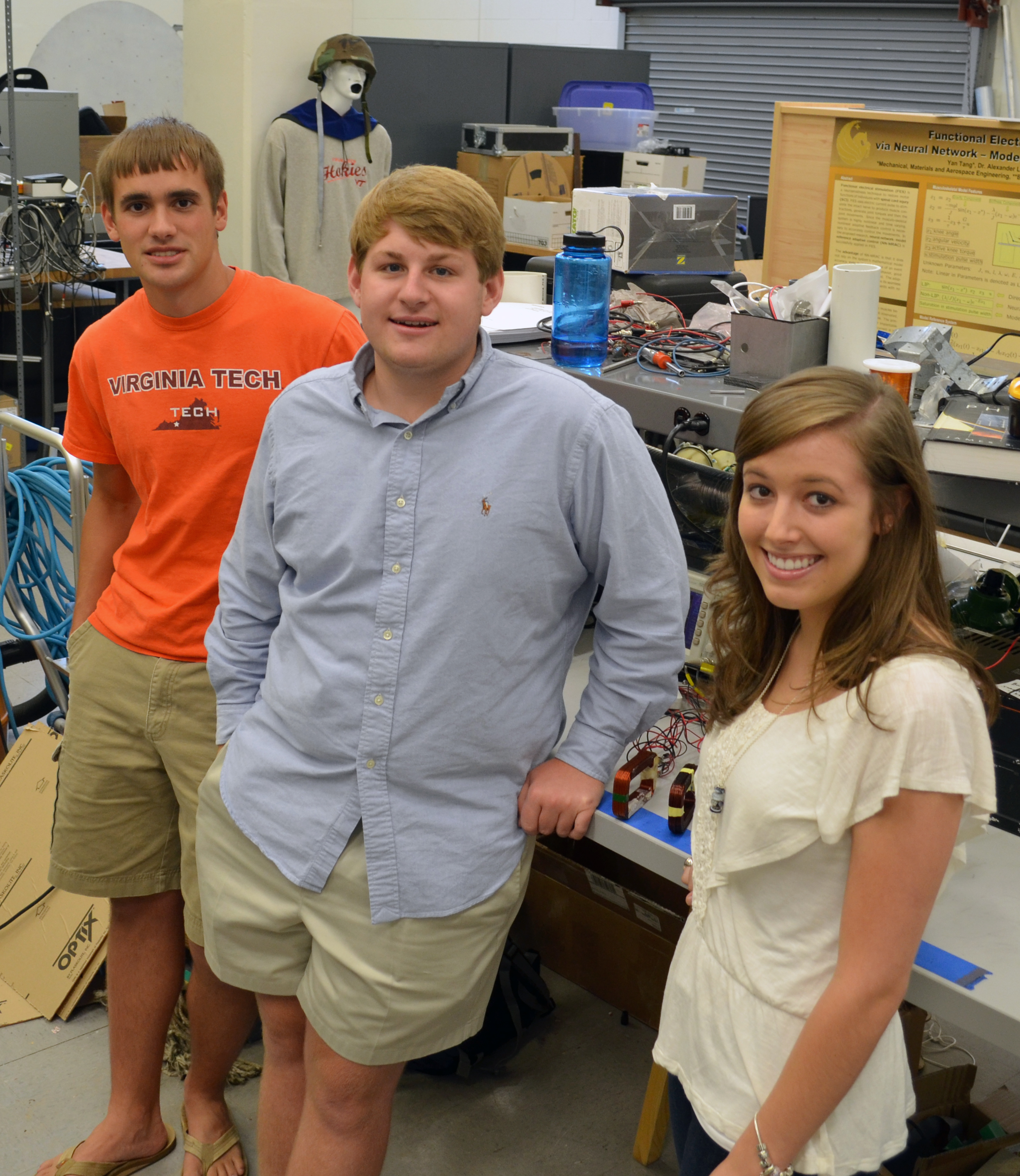Undergraduate students explore how electrical stimulation may be able to treat patients with vocal cord paralysis

After a stroke, patients often struggle to speak, swallow, or eat because the incident can cause vocal cord paralysis. Three undergraduate students are part of a team studying how electrical stimulation may help restore vocal cord function to these patients.
Garret Burks of Harrisonburg, Va., a junior majoring in mechanical engineering in the College of Engineering; Kyle Harring of Fredericksburg, Va., a senior majoring in biological sciences in the College of Science; and Madison Preib of Charlotte, N.C., a senior majoring in human nutrition, foods, and exercise science in the College of Agriculture and Life Sciences; are all involved in the research project this summer as part of the Scieneering program, a unique opportunity offered through the Division of Undergraduate Education, funded by a prestigious Howard Hughes Medical Institute Science Education Grant.
Providing stimulation to the vocal cords can be complex since the muscles are deep within the throat. Stimulation applied directly to the neck may not reach the vocal cords, causing pain and potential damage to the other muscles within the neck. To overcome that hurdle, the team is researching the development of coils to direct the electric current to the vocal fold.
“We have two coils – one would be implanted in the throat while the other would be exterior to the neck,” said Burks. “The exterior coil generates a magnetic field, producing an electric current in the internal coil, which stimulates the muscle.”
“Currently, we have been testing different waves, like sine or square waves, through coils and measuring the electrical output from the magnetic field,” said Harring. “We are trying to determine the best kind of wave to send to get the highest output.”
Right now, the coils the students are testing too large to be inserted – about six inches long and an inch thick. “The goal is to get the coils small enough to implant – they are called nano-coils,” said Preib. “The external coil would probably be a removable device around the neck, similar to a necklace or scarf. The other coil would be a nano-coil that we would insert into the neck. We would run the current through the external coil. It would transfer through the neck muscles to reach the nano-coil, which would then stimulate the vocal cords.”
One of the next steps in the summer research experience is to test the electrical stimulation of the coils in the presence of muscle and tissue by using pieces of meat.
The research project is lead by Alexander Leonessa, associate professor in the Department of Mechanical Engineering. Leonessa won a $480,000 National Science Foundation Faculty Early Career Development (CAREER) award for this research effort. The CAREER grant is the National Science Foundation’s most prestigious award, given to creative junior faculty likely considered to become academic leaders of the future.
“The Scieneering students have made good progress on the project,” said Leonessa. “They have completed what I expected to take the entire summer in just a month’s time.” Leonessa added that the students are involved in the very early stages of the research project, which is expected to take five years to complete.
The Scieneering program promotes interdisciplinary work within the fields of science, engineering, and law. That blend is what attracted Burks, Harring, and Preib to Leonessa’s project.
“This research experience helps me see how the knowledge I’ve gained from mechanical engineering can help me actually impact and help people. Seeing that directly is nice,” said Burks.
Harring and Preib both have aspirations of attending medical school and say this project’s biomedical engineering focus is a good way to build toward that goal.
“I don’t really have an engineering background, but it is good to learn different things,” said Harring. “It brings challenges you would not normally face in your own discipline. The Scieneering program is good at helping you accomplish challenges and get out of your comfort zone.”
“I am not an engineer, but Virginia Tech is known as a major engineering institution,” said Preib. “The Scieneering program is a good way to take advantage of the university’s strengths and get involved in research.”
The students will present their work on the project from the summer at the Joint SURF and Scieneering Summer Research Symposium on Aug. 3, 2012, at the Inn at Virginia Tech and Skeleton Conference Center. The public is invited to attend the event. More than 100 undergraduate students will present their summer research projects.
During the summer of 2012, the Fralin Life Science Institute Summer Undergraduate Research Fellowship (SURF) program and the Division of Undergraduate Education's Scieneering program have banded together to offer an unprecedented number of students — 82 — paid research fellowships. Research appointments, outreach, and group activities are coordinated by Tomalei Vess, director of undergraduate research, and Keri Swaby, Scieneering program manager. For more information, visit the Fralin Life Science SURF website and Scieneering program website.
Dedicated to its motto, Ut Prosim (That I May Serve), Virginia Tech takes a hands-on, engaging approach to education, preparing scholars to be leaders in their fields and communities. As the commonwealth’s most comprehensive university and its leading research institution, Virginia Tech offers 240 undergraduate and graduate degree programs to more than 31,000 students and manages a research portfolio of $513 million. The university fulfills its land-grant mission of transforming knowledge to practice through technological leadership and by fueling economic growth and job creation locally, regionally, and across Virginia.







.jpg.transform/m-medium/image.jpg)